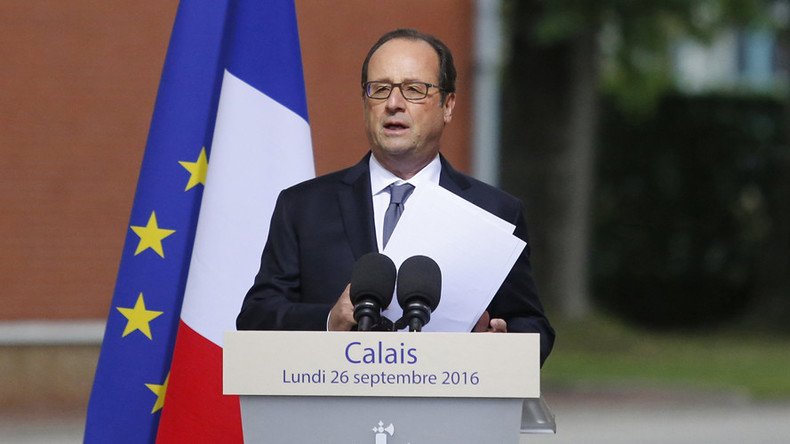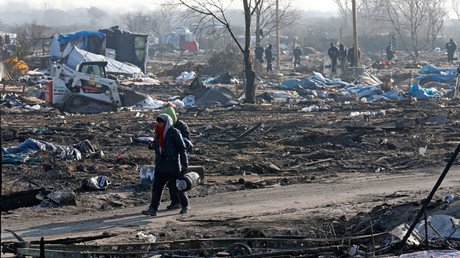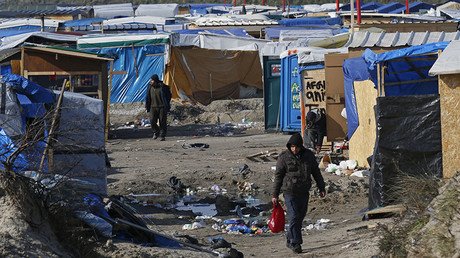Hollande pays personal visit to Calais, vows to completely dismantle 'Jungle' refugee camp

French President Francois Hollande personally vowed to “completely dismantle” the infamous ‘Jungle’ in Calais, as he visited the city that’s home to Europe's biggest migrant slum, hosting some 10,000 asylum seekers.
Hollande arrived in the coastal town by helicopter on Monday. His statement built on his Saturday claim that he would disperse all the Jungle migrants across the country and came at a time when his main rival in the upcoming election, Nicolas Sarkozy, took aim at the Jungle with tough anti-migrant rhetoric of his own. Sarkozy had paid a similar visit just days earlier.
Hollande vowed that the Jungle would be “definitely dismantled.” He came to meet with city and law enforcement officials, but was not scheduled to visit the camp itself.
The camp will be destroyed “before winter,” he said. Like Sarkozy before him, Hollande also said he’s determined to make Britain “play its part” in resolving the crisis. Most migrants’ ultimate goal is to cross the Channel and settle in the UK.
Individuals would have up to four months to seek asylum at migration reception centers, and if they don’t, they’d be forced to return to their home countries, as the decision entails.
“Our belief is that on this subject, it is possible to appeal to the right people. These are matters of great complexity, high sensitivity, but behind the political outbidding, the media hubbub, it is possible to explain things,” Hollande said.
“They call us extreme… we are only extreme because we want to defend our family,” the organizer spoke to the crowd.
Hollande’s morning visit to Calais bears all the markings of political campaigning. On his last week's visit to Calais, his conservative predecessor Sarkozy gave the kind of speech many found favor with.
“I’m here to listen to the people of Calais. There’s no region which has shown the humanity and restraint that you have. We want the Jungle to disappear. We don’t want the people to disappear, but we want the situation in Calais to return to normal,” he said.
Sarkozy’s toughness on immigration could resonate more with the voters than Hollande’s approach, as the former president harbors plans to reclaim his job.
Locals in Calais have shown increasing dismay at the French government’s inaction over the problem. The camp is only growing in capacity, while old problems like migrant crime and clashes with the law persist. Meanwhile, truck drivers making the arduous journey to the UK had become a near constant target of migrant attacks.
In April, authorities tried to bulldoze the Jungle, but reports that followed said the number of inhabitants resurged, while the humanitarian conditions continued to steadily deteriorate. The chaos that has been ongoing for years now has proved to be a test for the locals.
And Hollande’s plan to close the Jungle and relocate its inhabitants had been met with fierce criticism since it first came to light. No fewer than ,1000 protesters recently gathered in a town outside Paris to protest the construction of a new refugee camp, right next to the iconic Palace of Versailles. Locals in Yvelines chanted slogans against the government and against the idea of new arrivals.
Hollande’s plans to relocate the Jungle’s inhabitants to other centers across France is also arousing much suspicion from analysts. Speaking to RT, independent analyst Nikola Mirkovic criticized the idea of multiple so-called “mini-Calais” that threaten to pop up across France.
“It’s an open-door policy, but there are no jobs. There’s no infrastructure for greeting these migrants, which is creating political chaos,” Mirkovic said, adding that a sizeable chunk of the French population – 85 percent – don’t agree with the president’s policies of the past four years.
“And I think he wants to bring immigration and the situation of Calais to the forefront of the elections, because he knows that’s going to be a stumbling block for the French population,” particularly because Marine Le Pen – the far-right frontrunner - is doing very well now.














